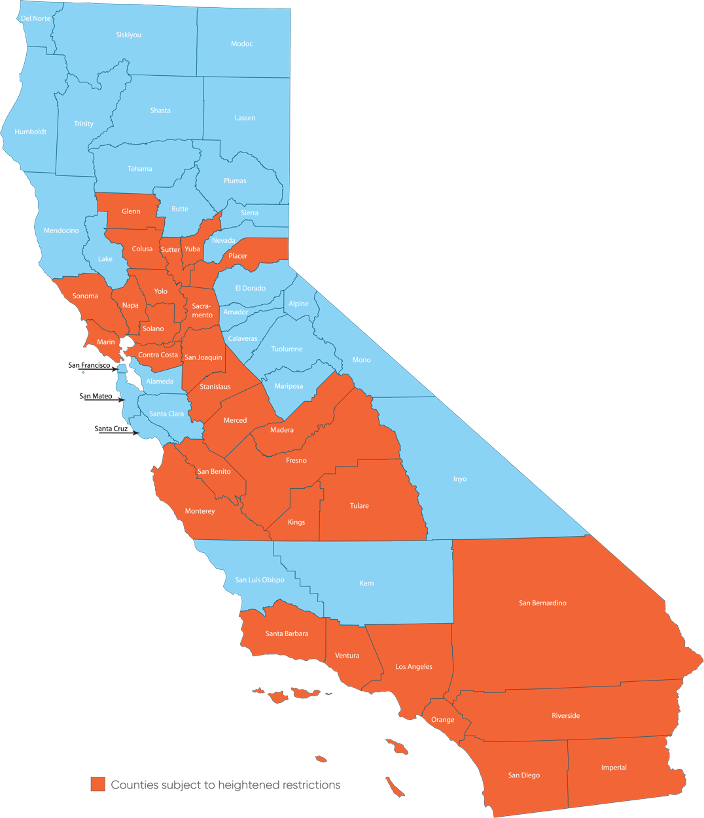Insights
Back to Work: California Re-Closes Businesses In Response to Increased Infection Rates
Jul 15, 2020California began the process of reopening the state in early May, but in recent weeks has been reinstituting controls in response to climbing infection rates.
Statewide Closures
On Monday the Department of Public Health (DPH) ordered the statewide closure of:
- Bars, pubs, brewpubs, and breweries unless they serve sit-down customers outdoors, and meals are sold alongside all alcoholic beverage.
- Indoor operation at dine-in restaurants, wineries and tasting rooms, although outdoor services are allowed, as well as takeaway.
- Indoor family entertainment centers.
- Indoor movie theaters.
- Indoor attractions at zoos and museums.
- Indoor services at cardrooms.
All closures were effective immediately upon issuance of the order, and will remain in effect until the DPH relaxes the restrictions. Importantly, these closures supersede any County orders to the contrary, and are binding across the state.
Additional Closures for High-Risk Counties
DPH has been monitoring several key metrics in all counties across the state, and has recently created the County Monitoring List for counties with (a) case rates of greater than 100 per 100,000 or (b) case rates greater than 25 per 100,000 and testing positivity over eight percent. The case rates are assessed over a 14-day period, while the testing positivity is assessed over a 7-day period. If a county remains on the Monitoring List for three consecutive days, it is deemed “affected” and subject to the heightened restrictions which require closure of indoor operations at the following types of businesses:
- Gyms and fitness centers,
- Places of worship,
- Protests,
- Offices for non-critical infrastructure sectors,
- Personal care services (including nail salons, massage parlors, and tattoo parlors),
- Hair salons and barbershops, and
As of July 1stthere were 19 counties on the County Monitoring List, but as of July 13th, there are 32, and DPH has indicated that serval more are anticipated to be added soon. The following is the list of affected counties, as of July 13:

Impact on Businesses
The impact on most of the businesses that are now closed, or limited in their operations is obvious, but the closure of “Offices for non-critical infrastructure sectors” may have a more significant impact than is immediately apparent. While some businesses may fit in one of the definitions of critical infrastructure sectors provided by the state, many will not, and are now required to close their offices.
For those businesses that are closed because their County is on the Monitoring List, there is uncertainty as to when they will be able to reopen, and for how long. For these reasons, businesses should consider longer-term remote working structures where possible to reduce the impact that this regulatory uncertainty will have on their business.
If you have questions about how these changes, or any of the other COVID-19 related regulations and orders across the country may impact your business please contact the authors of this article, or our COVID-19 Back to Work team.
Related Capabilities
-
Regulation, Compliance & Advisory
-
Employment & Labor
-
Real Estate
-
Restaurants, Pubs & Clubs
-
Retail & Consumer Products
-
Hotels & Hospitality


